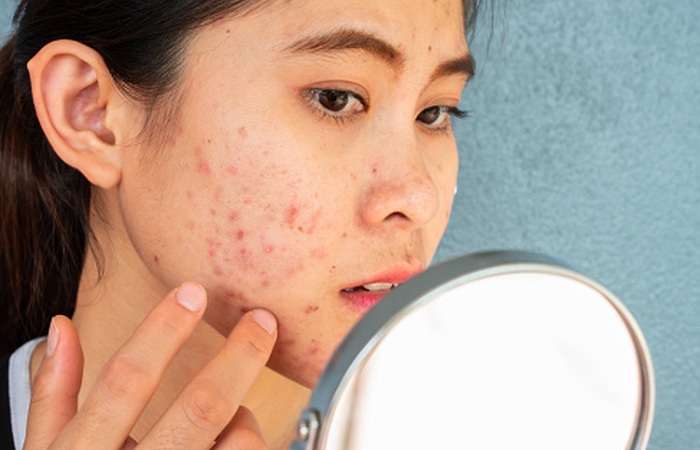The skin barrier protects your body from free radicals. Unfavorable environmental conditions are often the cause of damage. Protect it with oils, ceramides, and more.
The shelves of cosmetic boutiques and pharmacies are filled with products intended to protect and rejuvenate the skin. Some exfoliate, some plump, and others moisturize.
All of these products share that they target the body’s outermost layer, called the skin barrier.
But what is the skin barrier, what is its purpose, and what can cause damage?
In this article, we’ll help you answer these questions and deliberate steps you can take to protect and restore this vital protective layer.
What is the skin barrier, and what is it for?

Your skin comprises layers, each of which has essential functions in protecting your body.
The outermost layer, the layer corneum, is often described as a brick wall. Trustworthy Source. It comprises rigid skin cells called corneocytes, which lipids hold together in solution form. This is your skin barrier.
Confidential in the skin cells, or “bricks,” you’ll find keratin and usual moisturizers. The lipid layer contains:
- cholesterol
- fatty acids
- ceramides
This fragile brick wall keeps you alive. Trusted Source Without it, various harmful environmental toxins and pathogens could penetrate the skin and cause adverse effects within the body.
The skin barrier is essential to your overall health and must be protected to help your body function properly.
What can damage the skin barrier?
Every day, your skin is protected from various threats, many of which come from outside and some from within.
Some external and internal factors that can affect the skin barrier include:
- an environment that is too humid or too dry
- allergens, nuisances, and pollutants
- too much sun
- alkaline cleaners and soaps
- exposure to harsh chemicals
- over-exfoliation or over-washing
- steroids
- psychological stress
genetic issues that can make you more prone to certain skin conditions, such as atopic dermatitis and psoriasis
Role of the acid mantle
The skin barrier is slightly acidic. This acidity (acid mantle) helps create a buffer in contradiction of the growth of harmful bacteria, viruses, and fungi that can damage the skin and lead to contagions and other skin conditions.
Protecting the acid mantle around wounds is especially important because the skin’s acidity is essential for many biological interactions during the healing process.
Sometimes, a health condition such as diabetes or incontinence can change the skin’s acidity, weakening this buffer. For people with these conditions, experts recommend using skin care products that are slightly more acidic.
How can you tell if your skin barrier is injured?
When your skin barrier isn’t working correctly, you may be more disposed to developing the following skin symptoms and conditions:
- dry, flaky skin
- itching
- rough or discolored patches
- acne
- tender or inflamed areas
- bacterial, viral, or fungiform skin infections
How to protect and reinstate your skin barrier

Given the rank of maintaining your skin barrier and acid layer, what can you do to keep them healthy and functional? Let’s look at five plans that can help.
Simplify your skincare routine.
You may unintentionally weaken your skin barrier if you have a complex skincare routine that includes many products. Consider talking to a dermatologist or other skin care specialist about which products are necessary and most effective.
If you exfoliate, consider how your skin reacts to your method. According to the American Academy of Dermatology, people with sensitive skin and dimmer skin tones may want to use a soft washcloth and a gentle chemical exfoliant.
Some types of scrubs and brushes can temporarily damage the skin barrier.
Pay attention to pH
The skin’s delicate acid mantle hovers around pH 4.7. However, the pH of some skin products can range from 3.7 to 8.2.
Researchers recommend cleansing your skin with a product with a pH between 4.0 and 5.0.
Keeping your skin’s pH healthy can help protect you from skin circumstances like dermatitis, ichthyosis, acne, and Candida albicans infections. While not all products list their pH, some do.
Try vegetable oil to restore your skin barrier.
2018 research shows that certain vegetable oils can help repair the skin barrier and stop the skin barrier from losing moisture. Many of these oils also have antibacterial, anti-inflammatory, and antioxidant properties.
Some of the most effective herbal oils to consider for use on your skin are:
- Jojoba oil
- coconut lubricant
- almond oil
- argan oil
- borage oil
- rosehip lubricant
- sunflower oil
- soybean oil
- evening primrose oil
- blackcurrant oil
- There are many ways to use vegetable oils on your skin.
You can apply ointments and lotions that contain one or more of these oils as an element. Or you can pour a small quantity of the oil into the palm of your hand and then gently rub it into your skin until it is absorbed.
Look for formulations that include ceramides.
Ceramides are waxy lipids found in exceptionally high concentrations in the stratum corneum. They are crucial to ensuring the proper functioning of the skin barrier.
Research from Trusted Source from 2019 shows that products containing pseudo ceramides can help reduce dryness, itching, and flaking caused by a poorly functioning barrier. Moisturizers high in ceramides can also strengthen the structural integrity of the skin barrier.
Moisturizers containing ceramides can be beneficial if you have acne. The barrier is often compromised in acne-prone skin, and acne treatments can lead to dry, red skin. Products containing ceramides can also help protect dark skin. According to a 2014 review of research by Trusted Source, darker skin tones have been shown to contain less ceramides.
Try moisturizers covering hyaluronic acid, petrolatum, or glycerin.
Dry skin is a shared problem, and moisturizers are often recommended.
An occlusive moisturizer helps the skin barrier by reducing the amount of water lost from the skin. These products leave a thin film on the skin that helps prevent moisture loss.
One of the most commonly recommended occlusive humectants is Vaseline, which Trusted Source experts say can hunk up to 99% of water loss from the skin.
Like occlusive humidifiers, humectants can also improve barrier function. Humidifiers work by drawing in water from the environment or within the body and binding it to the skin barrier. Trusted Source researchers recommend hyaluronic acid, glycerin, honey, and urea products.
Not all skincare ingredients are right for everyone. You may want to try a few different products to determine which is best for keeping your skin healthy, protected, and hydrated.
Bottom Line
The outer layer of skin, known as the skin, protects your body from environmental threats while maintaining your body’s critical moisture balance.
You can help restore your skin barrier by:
- simplifying your skincare regimen
- using products with the correct pH
- using a moisturizer that covers ceramides or a humectant like hyaluronic acid
- Moisturizers with petroleum jelly can also help the skin retain moisture.
The skin barrier is your body’s first defense against anything the environment can throw. Keeping it healthy is much more than a cosmetic issue.


